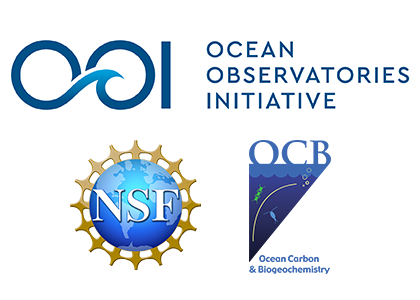Workshop to discuss scientific research ideas and best practices for using OOI biogeochemical sensor data
June 16-18, 2022 at WHOI
The NSF-funded OOI Biogeochemical Sensor Data Working Group was established in summer 2021 to develop guidelines and best practices for using OOI biogeochemical sensor data to broaden users and applications of these data, and build community capacity to produce analysis-ready data products. The Working Group has convened regular virtual meetings since July 2021, and members have developed a “cookbook” with explicit recommendations for end users working with data from four sensor sub-groups: dissolved oxygen, inorganic carbon parameters, bio-optics, and nitrate.
We will hold a workshop in Woods Hole on June 16-18, 2022 (the week before the Ocean Carbon & Biogeochemistry Summer Workshop), and are soliciting applications for current and prospective OOI biogeochemical sensor data users to join the existing Working Group members to review and discuss the OOI biogeochemical sensor data cookbook and to explore scientific questions that can be explored with these data. The cookbook includes 5 chapters which cover background information on the OOI arrays and the biogeochemical sensors deployed on them, information on data QA/QC and data access, as well as chapters dedicated to each of the 4 sensor sub-groups listed above. The two primary goals for this workshop are to:
- Discuss scientific research ideas using OOI biogeochemical sensor data, building on the foundation the Working Group has built over the past year through their focus on QA/QC. We envision that this could kickstart research collaborations, and will help inform a planned follow-on peer reviewed publication (e.g. Frontiers perspective article) that presents the exciting science that OOI biogeochemical data and the cookbook enable.
- Plan revisions and edits needed to finalize the cookbook in advance of dissemination to the wider community through Ocean Best Practices. This will include opportunities for the participants from outside the working group to share feedback after beta testing/reviewing the complete draft (in advance of the workshop).
To support the second of these goals, selected workshop participants will be expected to review and beta test a clean draft of the OOI Biogeochemical Sensor Data cookbook and prepare feedback to the Working Group members during the month prior to the in person meeting. We anticipate that this will be a significant time commitment (~10 hours) in the leadup to the workshop. We will prioritize selection of participants who are interested in continuing to engage with Working Group follow-on activities after the summer workshop.
We especially encourage applications from early career researchers and members of underrepresented groups. We have travel support available and will prioritize support of early career and underrepresented participants.
Applications are open, review begins April 15. Please apply here, please don’t hesitate to contact us if you have any questions.
Organizing committee:
Hilary Palevsky (palevsky@bc.edu)
Sophie Clayton (sclayton@odu.edu)
Heather Benway (hbenway@whoi.edu)





